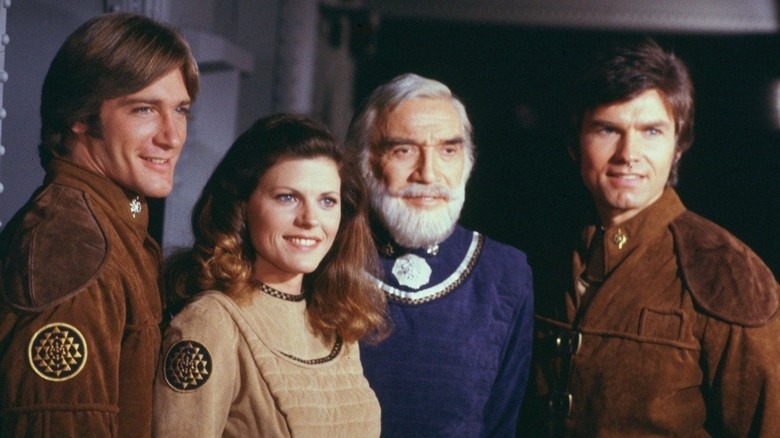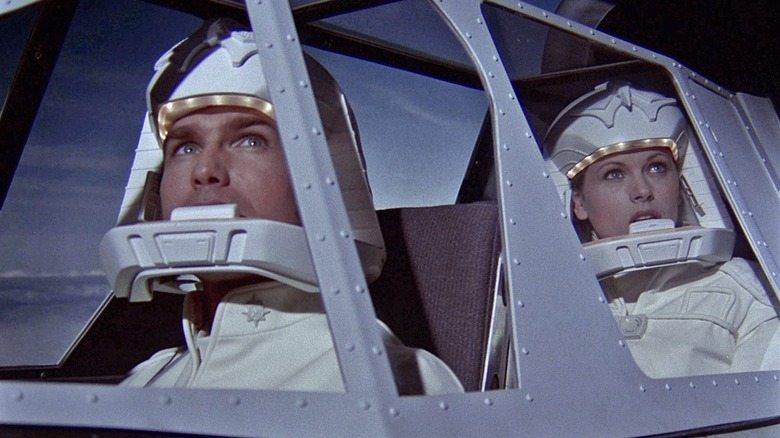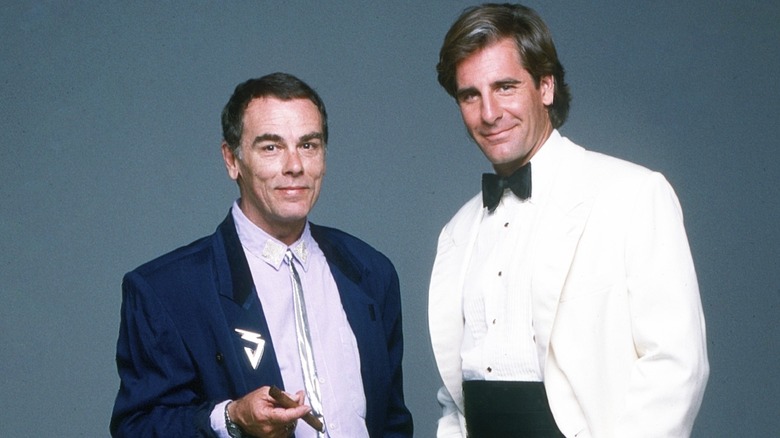How A Battlestar Galactica Spin-Off Turned Into Quantum Leap
The original "Battlestar Galactica" from 1978 was a show so filled with promise that it could have run for a dozen seasons instead of only one. But the series was prematurely canceled in April of 1979 despite its cult following. Even then, the potential for further adventures of the Twelve Tribes of humans fleeing the robotic Cylon tyranny remained: thanks to fan demand, ABC contacted series creator Glen A. Larson to revive the show in a less expensive capacity, and Larson along with "Battlestar Galactica" writer Donald P. Bellisario created "Galactica 1980." The duo's plan was that "1980" would be a series that would leap into the Galactica's future and our present, with Commander Adama and his Colonial Warriors finally finding the planet Earth.
Because ABC wished to air the show in a 7 P.M. time slot, FCC regulations at the time required that a portion of a program's content in that slot contain some educational value for children. Larson and Bellisario whipped up a workaround for this: they would have the Galactica heroes travel through time in every episode, meaning that historical lessons could be worked into each adventure. While this approach was yet another riff on the "Galactica" concept that would be abandoned, its inception led to the creation of a future series developed by Bellisario: "Quantum Leap."
A Chase Through Time!
The only remaining portion of "Galactica 1980" that retains Larson and Bellisario's original idea for the series is its three-part pilot, "Galactica Discovers Earth." In it, the Battlestar Galactica finally reaches Earth, but Commander Adama (Lorne Greene, one of only a few returning cast members from the original series) realizes that a technologically inferior human race would be helpless against the nearby Cylon horde following the Battlestar. With Adama choosing to hang back and not reveal their presence to Earth, the rebellious Commander Xavier (Richard Lynch) takes it upon himself to steal a Viper craft and use its engine to travel into the planet's past, so that the wayward Twelve Tribes in the present can arrive at a planet culturally and technologically prepared to receive them and defeat the Cylons. Realizing the immense damage Xavier could do, Adama dispatches two Warriors, Troy (Kent McCord) and Dillon (Barry Van Dyke) to pursue Xavier; the soldiers managing to bring along a present-day Earth journalist, Jamie (Robyn Douglass), as a primary source of knowledge on Earth's history. The three heroes chase Xavier to the 1940s, where the dastardly villain is trying to hand over Colonial technology to the Nazis in order to progress Earth's defenses more rapidly.
Troy, Dillon, and Jamie triumph in the end, but "Galactica 1980" would not be so lucky: ABC requested an even cheaper concept for the show, which would see the heroes tangle with small, local, and present-day character dramas in similar fashion to other classic and contemporary series like "The Fugitive" or "The Incredible Hulk." Just a scant seven episodes later, "Galactica 1980" would find itself canceled well before its time, just like its parent series.
A Way to (Quantum) Leap Forward With the Concept
Despite its failure thanks to a series of interferences, the initial premise of "Galactica 1980" still held a good deal of potential. The notion of heroes traveling to a different time period in history every week and having to solve a problem while not giving away themselves or their foreknowledge of the future was too rich to be wholly discarded.
In the late '80s, when Bellisario was offered by NBC to develop a new series for their network, the writer recalled how much he enjoyed the idea of just such a time travel show, believing it to be a perfect marriage of recurring, serialized characters and a weekly anthology. Thus, "Quantum Leap" was born, a series that follows Dr. Sam Beckett (Scott Bakula) who, with the help of a hologram transmission of his best pal from the future, Al (Dean Stockwell), "leaps" into various people from within his own lifetime, having to set the timeline straight before he can leap into the next person, hoping to eventually get back home.
The series would become a huge success, running for five seasons and earning 17 awards. While the heroes of the Galactica were stranded in space (until a highly regarded reboot series that ran for four seasons began in 2003), the adventures of Sam Beckett may never have happened were it not for Troy, Dillon, Jamie and Xavier's chase through time.


